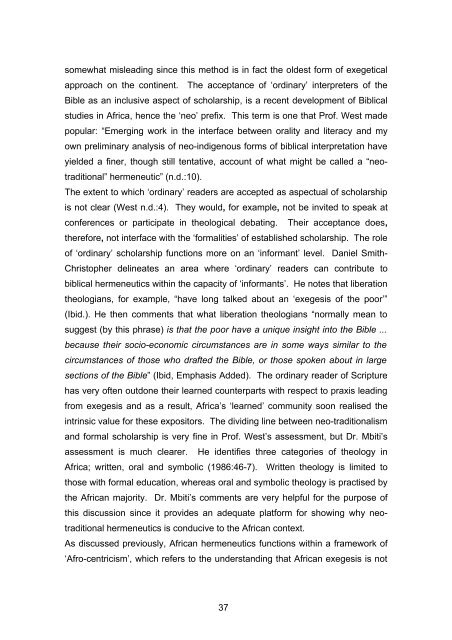African Hermeneutics: The Current State - Theology In Africa
African Hermeneutics: The Current State - Theology In Africa
African Hermeneutics: The Current State - Theology In Africa
Create successful ePaper yourself
Turn your PDF publications into a flip-book with our unique Google optimized e-Paper software.
somewhat misleading since this method is in fact the oldest form of exegetical<br />
approach on the continent. <strong>The</strong> acceptance of ‘ordinary’ interpreters of the<br />
Bible as an inclusive aspect of scholarship, is a recent development of Biblical<br />
studies in <strong>Africa</strong>, hence the ‘neo’ prefix. This term is one that Prof. West made<br />
popular: “Emerging work in the interface between orality and literacy and my<br />
own preliminary analysis of neo-indigenous forms of biblical interpretation have<br />
yielded a finer, though still tentative, account of what might be called a “neo-<br />
traditional” hermeneutic” (n.d.:10).<br />
<strong>The</strong> extent to which ‘ordinary’ readers are accepted as aspectual of scholarship<br />
is not clear (West n.d.:4). <strong>The</strong>y would, for example, not be invited to speak at<br />
conferences or participate in theological debating. <strong>The</strong>ir acceptance does,<br />
therefore, not interface with the ‘formalities’ of established scholarship. <strong>The</strong> role<br />
of ‘ordinary’ scholarship functions more on an ‘informant’ level. Daniel Smith-<br />
Christopher delineates an area where ‘ordinary’ readers can contribute to<br />
biblical hermeneutics within the capacity of ‘informants’. He notes that liberation<br />
theologians, for example, “have long talked about an ‘exegesis of the poor’”<br />
(Ibid.). He then comments that what liberation theologians “normally mean to<br />
suggest (by this phrase) is that the poor have a unique insight into the Bible ...<br />
because their socio-economic circumstances are in some ways similar to the<br />
circumstances of those who drafted the Bible, or those spoken about in large<br />
sections of the Bible” (Ibid, Emphasis Added). <strong>The</strong> ordinary reader of Scripture<br />
has very often outdone their learned counterparts with respect to praxis leading<br />
from exegesis and as a result, <strong>Africa</strong>’s ‘learned’ community soon realised the<br />
intrinsic value for these expositors. <strong>The</strong> dividing line between neo-traditionalism<br />
and formal scholarship is very fine in Prof. West’s assessment, but Dr. Mbiti’s<br />
assessment is much clearer. He identifies three categories of theology in<br />
<strong>Africa</strong>; written, oral and symbolic (1986:46-7). Written theology is limited to<br />
those with formal education, whereas oral and symbolic theology is practised by<br />
the <strong><strong>Africa</strong>n</strong> majority. Dr. Mbiti’s comments are very helpful for the purpose of<br />
this discussion since it provides an adequate platform for showing why neo-<br />
traditional hermeneutics is conducive to the <strong><strong>Africa</strong>n</strong> context.<br />
As discussed previously, <strong><strong>Africa</strong>n</strong> hermeneutics functions within a framework of<br />
‘Afro-centricism’, which refers to the understanding that <strong><strong>Africa</strong>n</strong> exegesis is not<br />
37


